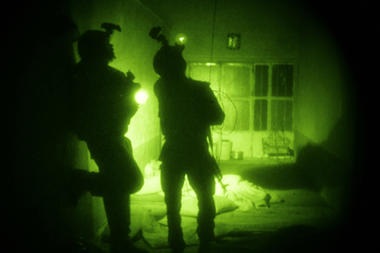By Tom A. Peter

In this 2009 file photo taken with a night vision scope, U.S. Special Operations forces search a home during a joint operation with Afghan National Army soldiers targeting insurgents operating in Afghanistan's Farah province. (Photo: Maya Alleruzzo/AP/File)
Over the past year, US and NATO forces say they have made considerable progress against the Afghan insurgency through the use of night raids. But a new study suggests that the long-controversial nighttime operations are doing more harm than good.
Despite a sharp rise in the number of night raids, there have been no benefits in the form of decreased insurgent attacks, and anger over the operations has continued to mount among Afghan civilians, found the report by the Open Society Foundations and The Liaison Office, a research and analysis group in Kabul.
“The dramatic increase in the number of night raids, and evidence that night raids or other operations may be more broadly targeting civilians to gather information and intelligence, appear to have overwhelmed Afghan tolerance of the practice," wrote the authors of the report. "Afghan attitudes toward night raids are as hostile as ever, if not more so.”
International forces rely heavily on night raids to capture or kill high-level insurgents. Night raids are a critical component of NATO’s strategy here, but a growing number of Afghans, including President Hamid Karzai, have condemned the raids as disrespectful to Afghan culture, and say they undermine the authority of the government and security forces.
With US and NATO forces moving toward the drawdown of troops and the gradual handover of security duties to the Afghan Army over the next few years, the controversy over night raids is worsening relations at a critical time.
Even in the face of heated political debate about the night raids, there was fivefold increase between February 2009 and December 2010. Though newer statistics are unavailable, military officials indicated to Open Society Foundations that international forces still conduct a large number of night raids, possibly at higher rates than those previously documented. By one estimate, up to 40 night raids occur daily throughout Afghanistan.
“The night raids are perceived by the people, by the government, by Afghans as an insult. It’s a very big insult because they are insulting our privacy … so people hate them from the depths of their hearts,” says Rahim Khurram, deputy director of The Liaison Office.
Without any changes to the night-raid policy, Afghan relations with the international community will likely deteriorate, says Mr. Khurram, adding, “The people regard Americans as our friends, and they are our friends because they rescued us from the Taliban and other bad characters, but this will change. I’m afraid of that.”
The US and international forces have made a number of changes to their night-raid policy that have, by many measures, improved their accuracy and addressed Afghan concerns. Among other changes, Afghan officials are now incorporated in the planning process, and 25 percent of night operations are led by Afghan forces.
Presently, International Security Assistance Force officials say that they get their target 80 percent of the time during night raids. The report does not state what portion of the remaining 20 percent escaped or if they mistakenly arrested the wrong person. ISAF officials also point out that the night raids account for less than 1 percent of civilian casualties and that 85 percent are conducted without any shots fired.
“Night operations are an effective method of maintaining the pressure on the enemy while minimizing risk to innocent civilians,” says US Army Lt. Col. Jimmie Cummings, an ISAF spokesman.
Many of the improvements have been overlooked or gone unnoticed by Afghans, however, due to the sheer quantity.
Despite pervasive disapproval of night raids among many Afghans, if conducted properly, they are a valuable tool against the insurgency, says Mirwais Yasini, a member of parliament from Nangarhar Province, where night raids have been a serious point of contention.
“We cannot do without them, because if we do away with the night raids it means we are cutting [ISAF’s] operational capacity to the day, and if we do that it means we’re cutting their operational capacity to less than 50 percent,” says Mr. Yasini.
He suggests that instead of raiding houses during the night, international forces should try surrounding a village at night and make arrests during the day time.



